Emmerson Mnangagwa brought a change of name only when he succeeded Robert Mugabe in Zimbabwe but the oppression for more than forty years continues.
Vice President is fired, a coup d'etat, then a new President of Zimbabwe in three weeks
Emmerson Mnangwagwa had been appointed the third First Vice-President of Zimbabwe in 2014 and a loyal enforcer for the President of Zimbabwe, Robert Mugabe. This was ongoing reward for service that started during the 1970s when they were in Mozambique.
This changed in November 2017. It appeared that the 93-year-old, Jesuit-educated Robert Mugabe had not been in power for some time, no doubt due to his increasing physical and perhaps mental frailty. Real power has been exercised by his wife, Grace, and the faction around her. Recently there have been manoeuvrings to do with the succession. The vice-president and long-term heir apparent, Emmerson Mnangagwa, was unceremoniously sacked by Grace and her faction on 6th November. Two days later he fled to South Africa via Mozambique, claiming that his life was in danger. It seemed Grace had won the succession struggle. However, faced with the prospect of his second wife and former secretary ruling the country, the army became motivated.
That led the military to step into the party's factional battle by sending tanks into the streets on 15th November in the coup d'etat. The president was put under house arrest - a move that opened the door for the party's Central Committee to sack Robert Mugabe from Zanu PF on 19th November.
The people had turned a few years previously but the military had become embroiled against their leader who took power after the end of white rule in 1980.
Emmerson Mnangwagwa - known to some as "The Crocodile" - took command of the southern African country in rousing style on Friday 24th November 2017 when he was sworn in as the nation’s new president - only Zimbabwe’s second leader in nearly four decades - to shouts and singing from tens of thousands of people.
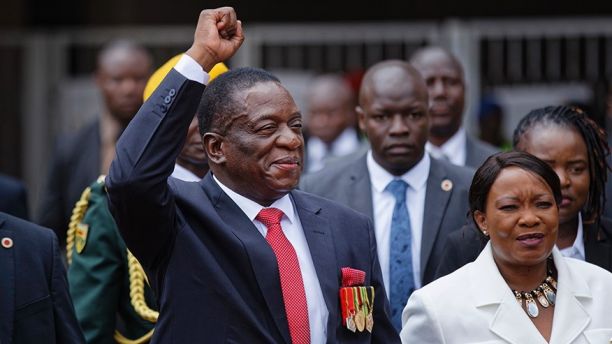 A smiling Emmerson Mnangagwa greeted the crowd at a packed stadium, promising to reduce crushing unemployment and return the country to prosperity after years of decline. “Our economic policy will be directed for job, job, job creation” he told the crowd of 60,000 in the capital, Harare. “We must work together. You, me, all of us who make up this nation. I must hit the ground running.”
A smiling Emmerson Mnangagwa greeted the crowd at a packed stadium, promising to reduce crushing unemployment and return the country to prosperity after years of decline. “Our economic policy will be directed for job, job, job creation” he told the crowd of 60,000 in the capital, Harare. “We must work together. You, me, all of us who make up this nation. I must hit the ground running.”
Mnangagwa, a former justice and defense minister, had been Mugabe’s ruthless enforcer, accused of overseeing the brutal deaths of thousands of political opponents. He is the subject of U.S. sanctions targeting officials in Zimbabwe’s repressive regime.
Mnangagwa had returned from a brief exile to widespread support from Zimbabweans who welcomed his promises of democracy. His speech on Friday struck notes of inclusion and reconciliation after years of growing frustration with Mugabe’s rule.
He promised to tackle corruption and pledged “democratic” elections would be held next year as planned. Mnangagwa also praised Mugabe, who remains a respected figure by many in Africa for his role in ending white ruled Rhodesia. Mugabe should be “lauded and celebrated” for his work, Mnangagwa said, to tepid applause.
Mugabe did not attend Friday's swearing-in, and ruling party officials have said he will remain in Zimbabwe after they promised he was "safe" and his legacy as a "hero" would stand.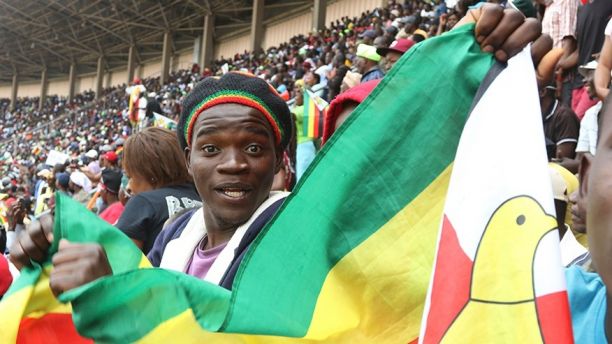
Zimbabwe's state-run Herald newspaper reported Mnangagwa assured Mugabe and his family of their "maximum security." The report said the two men agreed Mugabe would not attend Friday's ceremony because he "needed time to rest."
Ahead of the inauguration, some people began to dance in the stadium stands. Banners read "Dawn of a new era" and "No to retribution," even as human rights activists began to report worrying details of attacks on close allies of the former first lady and their families. Mnangagwa has warned against "vengeful retribution."
Tendai Lesayo held a small Zimbabwean flag as she sold drinks from a cooler outside the stadium. She said she would welcome a fresh start, saying "life now is impossible."
Elsewhere in the capital, long lines formed outside banks, a common sight in a nation struggling with cash shortages and other severe economic problems that the new president will have to confront.
"Right now, nothing has really changed for me. I still cannot get my money from the bank," said Amon Mutora, who had been in line since 6 am.
"Attending the inauguration will not bring food for my family," said Kelvin Fungai, a 19-year-old selling bananas from a cart. Many young people are well-educated but jobless, reduced to street vending to survive. Others have left the country.
Army opens fire on opposition protesters in Zimbabwe capital during wait for election results
Zimbabwe is a country on the brink after six people have been killed who accused the government of rigging the 30th July 2018 election.
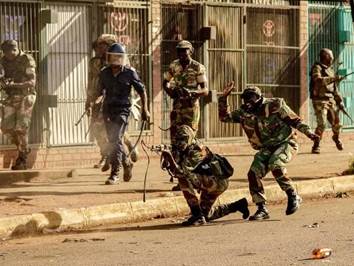 The deployment of soldiers and their beating of unarmed protesters set back President Emmerson Mnangagwa’s efforts to shed Zimbabwe’s pariah status after decades of repression under Robert Mugabe, who was ousted in the coup eight months previously.
The deployment of soldiers and their beating of unarmed protesters set back President Emmerson Mnangagwa’s efforts to shed Zimbabwe’s pariah status after decades of repression under Robert Mugabe, who was ousted in the coup eight months previously.
Even before the violence, European Union observers questioned the conduct of the presidential and parliamentary poll, Zimbabwe’s first since Mugabe was forced to resign. The observers expressed concern about delays in releasing the results of the presidential contest.
Thousands of supporters of the opposition Movement for Democratic Change (MDC) chanted anti-government slogans and destroyed benches, signs, traffic lights prompting police to fire warning shots, water cannon and tear gas in an attempt to disperse the crowds.
Protesters responded by burning tyres and throwing rocks until the army intervened sending people running for cover as many were wounded.
Officers had been facing off through a locked gate against protesters who brandished opposition party banners, lit fires and chanted slogans against the ruling ZANU-PF party.
“You said you were better than Mugabe — you are the picture of Mugabe,” shouted one young male protester wearing a white T-shirt. “We need security for the people.”
Thousands of supporters of the opposition Movement for Democratic Change (MDC) chanted anti-government slogans and destroyed benches, signs, traffic lights prompting police to fire warning shots, water cannon and tear gas in an attempt to disperse the crowds.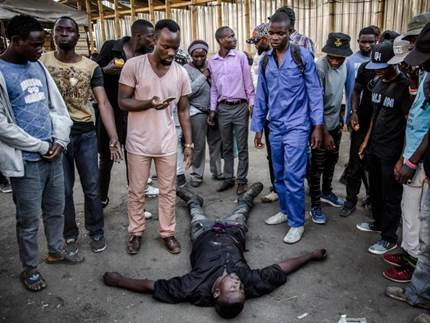
Opposition leader Nelson Chamisa’s Movement for Democratic Change (MDC) has accused President Emmerson Mnangagwa’s ZANU-PF party and the Zimbabwe Electoral Commission of using underhand tactics to steal the election from them.
An angry crowd of mostly young men, some of whom covered their faces, whistled and chanted “Chamisa, Chamisa” in downtown Harare.
It comes as Zimbabwe’s president warned against making “provocative statements” as protesters ran rampant through the streets. “Now is the time for responsibility and above all peace,” President Emmerson Mnangagwa said on Twitter.
Meanwhile, opposition challenger Nelson Chamisa is again claiming victory over Mnangagwa writing on Twitter that, “No amount of results manipulation will alter your will.”
Mnangagwa wins first post-Mugabe election
President Emmerson Mnangagwa has been declared the winner of Zimbabwe's election. Zimbabwe President Emmerson Mnangagwa, a former spy chief, installed after Robert Mugabe's removal in a coup in November of the previous year, has been voted in after a poll marred by the deaths of six people in an army crackdown on protests.
After two days of claims and counterclaims, the 75-year-old Mnangagwa secured a comfortable victory, polling 2.46 million votes (50.8%) against 2.15 million (44.3%) for 40-year-old opposition leader Nelson Chamisa.
The election, the first since the army's removal of 94-year-old Mugabe, passed off 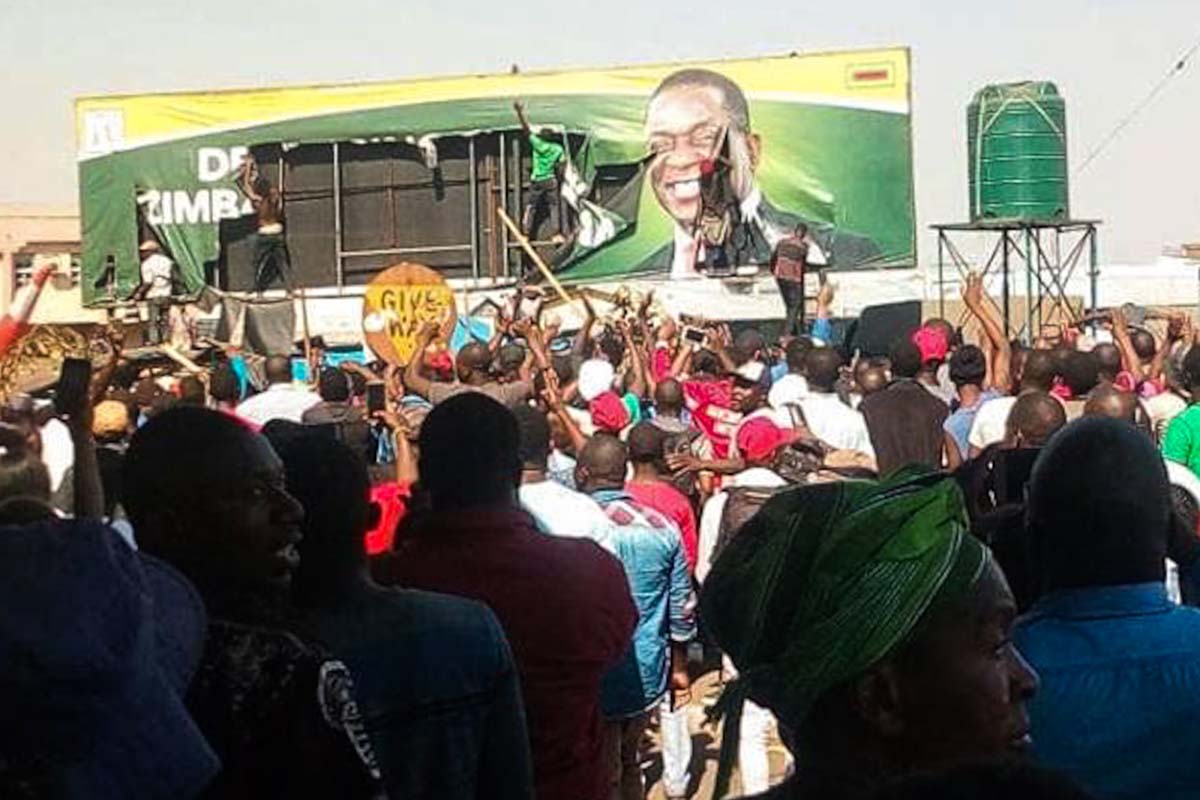 relatively smoothly but its aftermath revealed the deep rifts in Zimbabwean society and the instinctive heavy-handedness of the security forces.
relatively smoothly but its aftermath revealed the deep rifts in Zimbabwean society and the instinctive heavy-handedness of the security forces.
On Wednesday, 1st August, 2018, troops backed by armoured vehicles and a military helicopter were sent in to crush demonstrations by opposition supporters who said Mnangagwa's ZANU-PF party had rigged the elections.
Soldiers, some with their faces obscured by camouflage masks, opened fire with automatic weapons so death was unavoidable.
The following day, soldiers ordered civilians off the streets of the capital, despite calls from foreign governments and international organisations for calm and for political leaders to show restraint. Police then sealed off the headquarters of Chamisa's Movement for Democratic Change (MDC) before storming the building and arresting 16 people. The search warrant said they were looking for unlicensed firearms, grenades and stones.
Coupled with video of soldiers firing on unarmed demonstrators on Wednesday, the raid does serious damage to Mnangagwa's efforts to rehabilitate the image of a country synonymous with political repression and economic collapse.
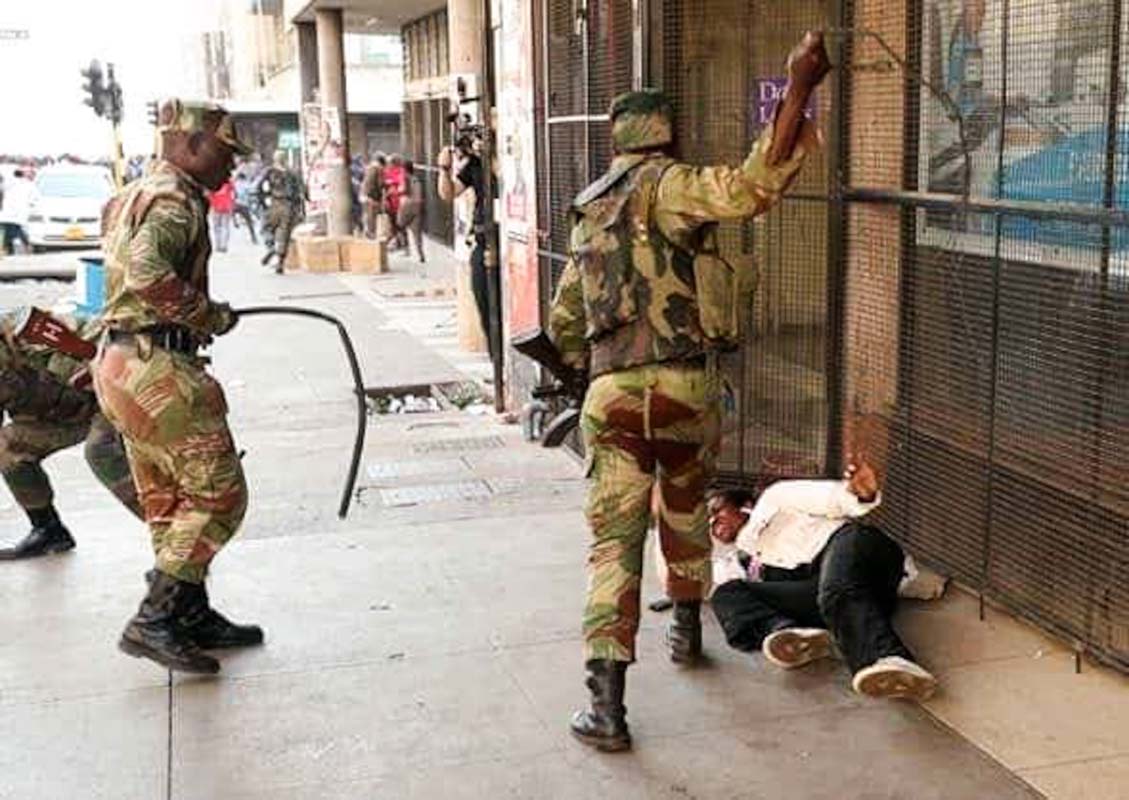 Questioning the independence of the judiciary, Chamisa said he was reluctant to go to court to challenge the results, saying this would be "going into the lion's den".
Questioning the independence of the judiciary, Chamisa said he was reluctant to go to court to challenge the results, saying this would be "going into the lion's den".
"We are not about to be a meal for lions," he told reporters, alleging that Mnangagwa's ruling ZANU-PF party had rigged the poll but without providing any concrete evidence.
Before the police stormed the MDC headquarters, Secretary General Douglas Mwonzora said 27 party workers carrying out voter tabulation were locked inside its offices by officers who had sealed off the building.
"We will not recognise that search warrant because they want to plant evidence. They want to disrupt our results tabulation process, that's all," he said.
Wednesday's crackdown by the army crushed the last vestiges of euphoria that followed its removal of Mugabe in November and fuelled suspicions that the generals who launched the coup remained Zimbabwe's de facto rulers.
In Harare, the contrast could not have been starker with November, when hundreds of thousands filled the streets, hugging soldiers and celebrating their role in ousting Mugabe, the only leader Zimbabwe had known since independence in 1980.
"They are showing their true colours now. We thought they were our saviour in November but they fooled us," said newspaper vendor Farai Dzengera, saying that the brief dream of an end to decades of repression was over.
Nearly all shops in downtown Harare were shuttered and the normally bustling pavements quiet the day after the bloodshed.
Mnangagwa's spokesman, George Charamba, insisted that Thursday was a normal working day. "They must go about their business as always," he said on state television.
But accusations of vote-rigging by Nelson Chamisa, the MDC leader who claims to have been the victor, have been met with a brutal crackdown. Last week riot police stormed a press conference by Mr Chamisa while it was Mr Mnangagwa’s own presidential guard that shot protesters in the capital, Harare, killing at least six people with automatic fire.
Amnesty International said that more than 60 people have been arbitrarily arrested in what its southern African director, Deprose Muchena, called “a vicious campaign of torture, intimidation and suppression of dissenting voices”.
There is “real fear” as more and more party members are being detained in unknown locations, said Nkululeko Sibanda, Mr Chamisa’s spokesperson. Tendai Biti, a senior MDC figure, said he had narrowly escaped “abduction” on Friday and had gone into hiding.
Mr Mnangagwa has pledged an independent investigation into last week’s shootings. But the mounting crackdown has come amid signs of a split within the security forces over the election’s aftermath.
The brutality bears the hallmarks of Constantino Chiwenga, the former commander of the armed forces who led the coup and became Mr Mnangagwa’s vice-president, said Fidelis Mudimu, director of the Counselling Services Unit, an NGO that deals with victims of political violence. Some observers see Mr Chiwenga as the power behind the throne in what is effectively a military junta and say that he is in control of the presidential guard.
“There is a splinter in the army that is loyal to their former commander, the current vice-president,” while other units remain loyal to Philip Sibanda, head of the armed forces, Mr Mudimu said. “These splits can break out into violence any time. Mnangagwa has to sort this out quickly.”
Doubling of fuel price results in protests that prompt detentions and more death
Protests followed again in Zimbabwe on 14th January 2019 following a 130% increase in the price of fuel imposed by the government of Emmerson Mnangagwa. Thousands of 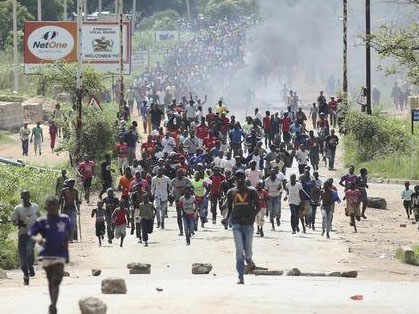 Zimbabweans protested against the price increase, along with increasing levels of poverty, the poor state of the economy, and declining standards of living. Beyond the capital, disturbances were also reported in the cities of Mutare and Bulawayo. The government responded with a coordinated crackdown that involved raiding the homes of some residents and resulted in hundreds of arrests and multiple deaths. The protests stopped after three days when businesses started reopening.
Zimbabweans protested against the price increase, along with increasing levels of poverty, the poor state of the economy, and declining standards of living. Beyond the capital, disturbances were also reported in the cities of Mutare and Bulawayo. The government responded with a coordinated crackdown that involved raiding the homes of some residents and resulted in hundreds of arrests and multiple deaths. The protests stopped after three days when businesses started reopening.
The government reported that three people, including one policeman, had died in the protests. Non-government sources claimed that around 200 people had been arrested and that eight had been killed in the protests by police by the end of the first day of protests.
The Zimbabwe Association of Doctors for Human Rights (ZADHR) stated that 172 people had been injured, of which 68 were treated for gunshot wounds. Indiscriminate acts of violence by the police on both protesters and bystanders were also reported, along with acts of looting by some protesters in Harare, Bulawayo and Kadoma. By 18 January, the ZADHR had recorded 844 human rights violations that included 78 gunshot injuries, 466 arbitrary arrests and detentions, as well as 242 cases of assault and degrading treatment.
Internet monitoring group NetBlocks reported the blocking of over a dozen social media and messaging platforms in Zimbabwe including WhatsApp, Facebook, Twitter and Instagram followed by total internet blackouts. The government extended its disruption to a full 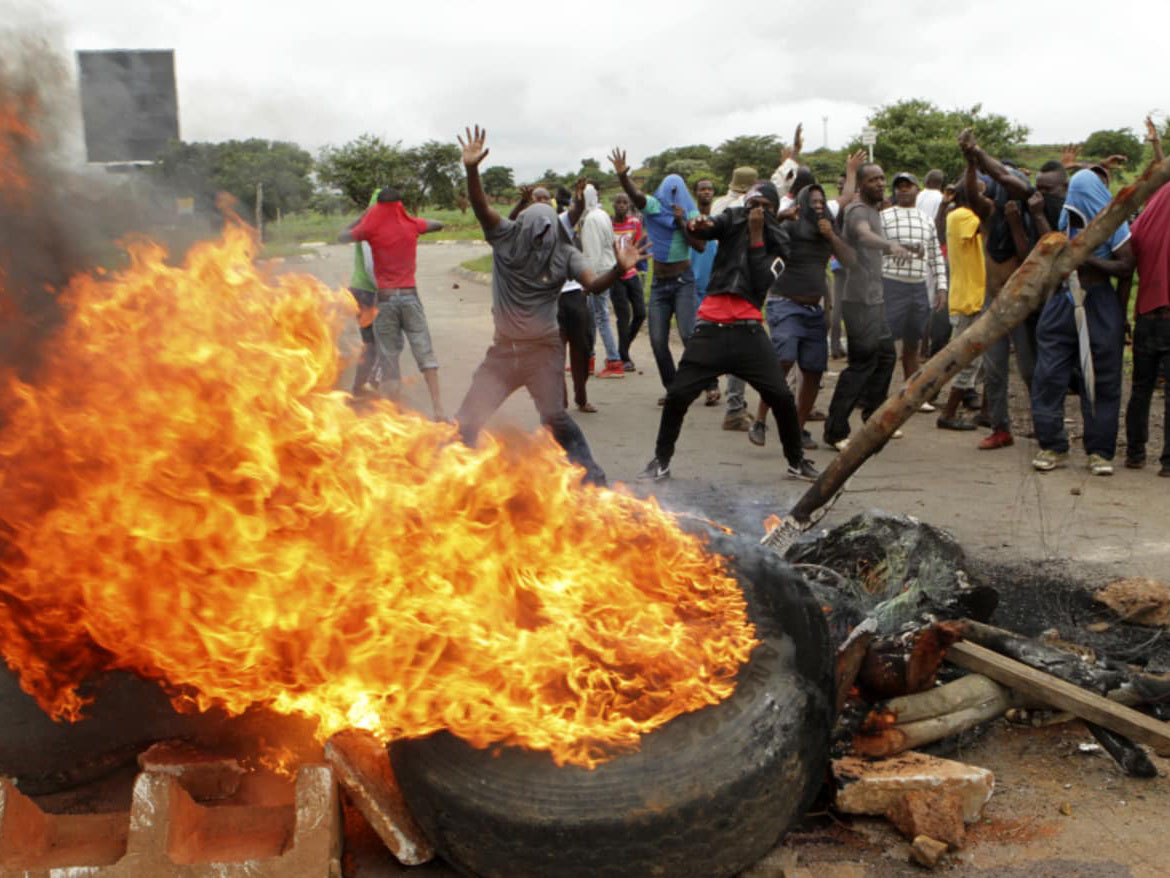
shutdown to prevent the use of VPN circumvention tools by demonstrators. The country's largest cellular provider, Econet, confirmed that the government issued a directive blocking all internet access during the protests. After the protests ended the Zimbabwean High Court ruled that the internet shutdown was illegal and ordered it to be restored.
On the third day of the protests, civil society activist and pastor Evan Mawarire was arrested. Mawarire's lawyer stated that the government alleged that his inciting of violent protests on Twitter as the reason for the arrest. The Movement for Democratic Change – Tsvangirai (MDC-T) stated that its party leadership had been detained by security forces during the protests. An unknown number of abductions by security personnel were reported during the crackdown on the protests. A Zimbabwe soldier described to the Telegraph how he had commited rape and broke legs. Dusk had fallen on the second day of violent anti-government protests in Harare when the company commander gathered his men and relayed orders for the night's operation.
The task, said the long-serving NCO, was straightforward: go into the poor suburbs of Zimbabwe's capital, locate opposition activists, and 'punish them'.
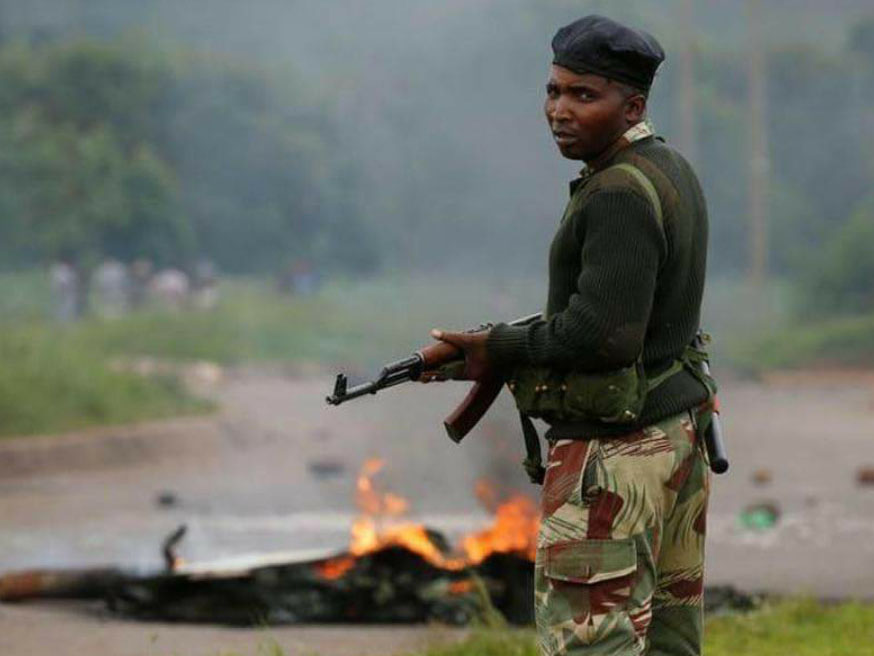 "Our lieutenant told us to go in and find them. We got our information of where the Movement for Democratic Change activists live from members of our party, Zanu PF," the soldier told the Telegraph this week.
"Our lieutenant told us to go in and find them. We got our information of where the Movement for Democratic Change activists live from members of our party, Zanu PF," the soldier told the Telegraph this week.
According to his own account, the soldier would take part in systematically breaking legs and would personally commit at least one rape in a door-to-door operation on the night of January 15.
At this stage, the count is speculated to have reached 12 people that have been killed and more than 300 wounded, many of them with gunshot wounds, since violent protests broke out across the country in January 2019.
Zimbabwe's government has denied authorising soldiers to commit abuses in its efforts to restore order.
But the country's independent Human Rights Commission has accused security forces of systematic torture in the subsequent crackdown. Rights groups on Friday raised the alarm about sexual violence.
"We have received very disturbing reports of a number of cases of women allegedly raped by members of security forces," Dewa Mavhinga, southern Africa director for Human Rights Watch, said on Friday. 
"Beatings, harassment and other abuses have continued after Mnangagwa's return and there are no clear actions from the government to hold accountable those committing the abuses."
Police spokeswoman Charity Charamba said she had not received any reports of rape.
In direct contrast, The Telegraph reported that the soldier had said he had no regrets and freely admitted to committing rape. “It was night. We were looking for someone in the MDC. We had an address, this lady was sleeping with a light on. I asked is her husband there, and she said she doesn't have one. I was done in a minute," he said.
The man also said his unit, who wore civilian overalls and no insignia during the operation, broke “many bones” of MDC supporters by pinioning them to the open back panel of an army pick up truck and then smashing it closed on their legs.
"We are going to deal with people calling for demonstrations. They will hide under doors, under beds. The schoolchildren who joined the demonstrations, most of them are MDC, and most of them are taught by their parents to do this.
"And so we have to beat them. We stopped them. Don’t believe we didn’t stop them. We did. We will do this again,” he said.
A solider in a different regiment said he had been sent on a similar punitive expedition in poor townships last week.
Zimbabwe's High Court on Friday deferred until next week a decision on whether to free an activist pastor detained during the protests.
Evan Mawarire, who led a national shutdown in 2016 against Robert Mugabe, has been accused of inciting the unrest. Prosecutors argued against the bail application, saying Mr Mawarire posed a flight risk and could re-offend if released.
Judge Tawanda Chitapi said he would rule on Tuesday but hinted he could ban Mr Mawarire from posting videos similar to the one that the state says encouraged unrest until the trial is over.
The #BlackWednesday call for women in Zimbabwe to wear all black clothing gained traction. The call to wear all black was organised by Tsimba Kadzi with the aim of highlighting the wanton abuse of women and to stop the sexual violence being perpetrated by soldiers against women. 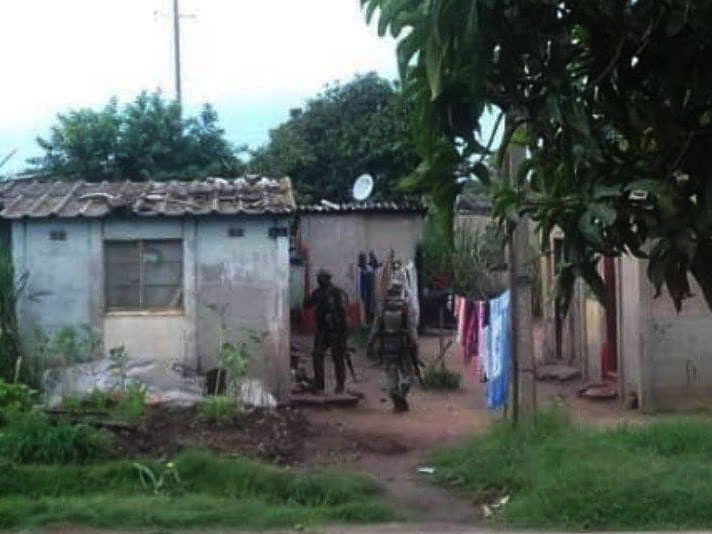
Since exposing the scale of violence in Zimbabwe last weekend, The Sunday Times has been contacted by numerous victims and their families. These are some accounts:
The two girls, one 11 and the other 12, were on their street in the Pumula district of Bulawayo one afternoon, going between each other’s homes, when they made the mistake of peeping through the wall of the police station to see what had happened to their neighbours who had been locked up. They were spotted, dragged in by soldiers and raped in the courtyard.
“I’m losing faith in humanity,” said Nkululeko Sibanda, spokesman for Zimbabwe’s opposition Movement for Democratic Change, in tears after speaking to the girls. “What’s happening here is beyond my ability to process.”
The hairdresser in hospital after soldiers broke all her fingers...
The teenage boy stripped naked with knives by soldiers then flogged after they could not find his uncle, a union leader...
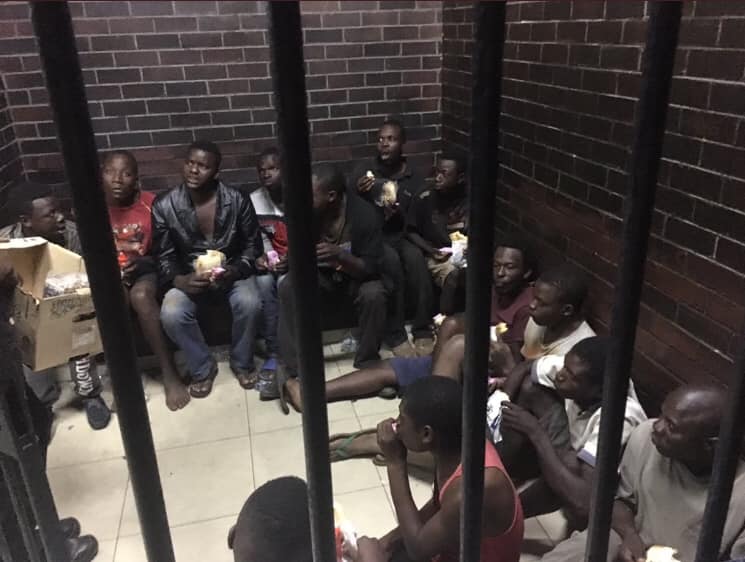 Every day more are added to the hundreds detained.
Every day more are added to the hundreds detained.
President Emmerson Mnangagwa returned from an overseas trip in the early hours of Tuesday, calling the violence “unacceptable”. The shootings may have stopped but the campaign of terror unleashed on Zimbabwe’s poor has continued.
While his Cambridge-educated finance minister, Mthuli Ncube, was posting pictures on Twitter yesterday of meeting investors in Zurich after attending Davos, soldiers in Zimbabwe were smashing up small businesses and menacing people on public buses.
So who is really in control just 13 months after Zimbabwe celebrated the end of 37 years of dictatorial rule under Robert Mugabe?
“It’s all about power,” said Beatrice Mtetwa, Zimbabwe’s leading human rights lawyer. “There can be no question but that Zimbabwe is under military rule — the army is in control.”
“This is a battle between reformers and hardliners,” explained a close adviser to Mnangagwa. “Effectively we have two presidents.”
The adviser was referring to Mnangagwa and his deputy, General Constantine Chiwenga, who as army chief led the move against Mugabe in November 2017.
Those close to both men say there is little love lost between them and that Chiwenga has grown impatient with Mnangagwa for appointing people from his Karanga tribe and profiting from stakes in diamond mines and Zuwa, the country’s biggest petrol station chain. 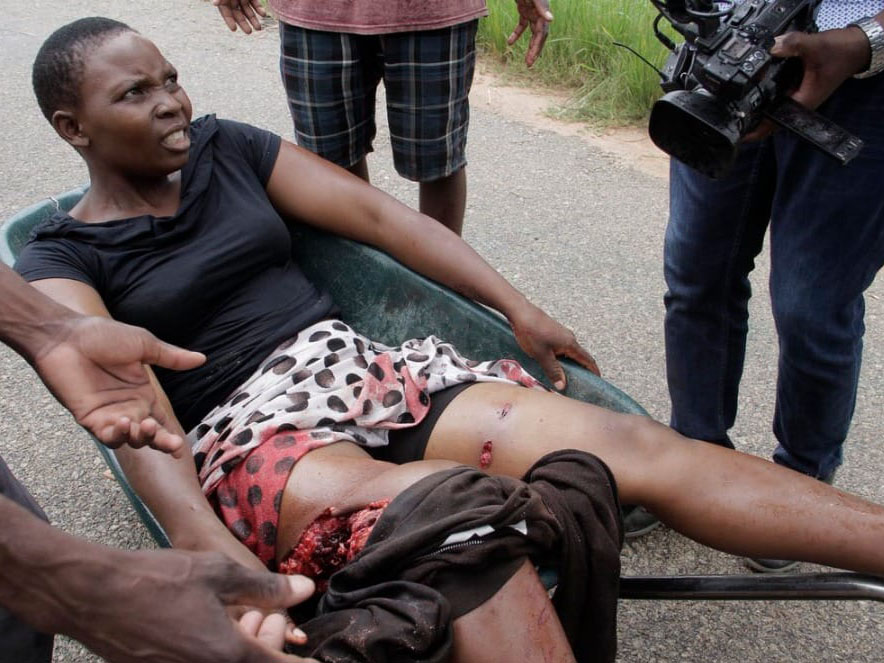
“[Mnangagwa] has become too greedy and people are fed up,” said a foreign businessman who has known both men for decades. “Diamonds, fuel . . . he hasn’t stopped collecting and putting pressure on people.”
Mnangagwa left the country earlier this month on an investment-raising tour after announcing that fuel prices would more than double. When fuel protests erupted and a nationwide stayaway from work began, Chiwenga decided to act.
The Sunday Times has learnt that, at the height of the street crackdown, there were plans either to impeach the president or launch a coup on January 18 — but Chiwenga failed to get enough support from fellow MPs in the ruling ZANU-PF party and the presidential guard remained loyal. Some MPs publicly said they had been threatened by Chiwenga’s men.
“They threatened to kill me and harm my family,” tweeted one. “I stand by Mnangagwa. The plot is foiled. They lack numbers for impeachment.”
“The whole stayaway and protests was a pretext for the military to come out,” claimed the presidential adviser. “There are so many fissures within government, lots of people aligned to Chiwenga, also some with Grace Mugabe [the wife of Mnangagwa’s predecessor]. There’s also a tribal element. It’s a complete mess.”
The adviser added: “It’s a battle for the control of Zimbabwe and control of resources, the fact that shit hits the fan the moment he is out of the country I don’t think is a coincidence.”
Terence Mukupe, a former Wall Street banker who was Mnangagwa’s deputy finance minister and has family ties to him, also tweeted that he was receiving death threats to switch sides. “I will never sellout on my President,” he wrote. “You are wasting your time threatening to kill me and my family . . . I will never join your sick plot!!! Come get me and do as you please but my President is not going anywhere!!!”
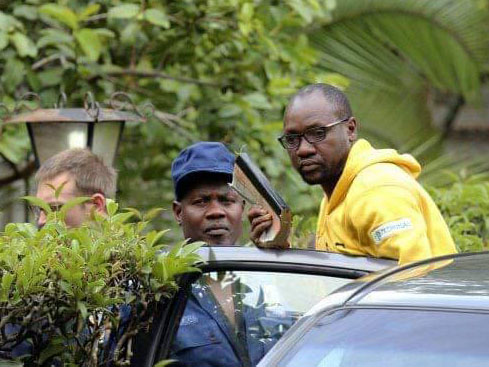 Mnangagwa is himself no stranger to violence, having headed the feared CIO intelligence agency during a crackdown in the 1980s in which thousands were killed in Matabeleland.
Mnangagwa is himself no stranger to violence, having headed the feared CIO intelligence agency during a crackdown in the 1980s in which thousands were killed in Matabeleland.
Mukupe insisted to The Sunday Times that Mnangagwa has changed and his focus now really is on reopening the country for business. Referring to a prophecy made by a local pastor last year, he added: “He was told by his prophet if he directly orders spilling of blood that would be the end of his presidency and he believes that.”
Mukupe said he had no doubt the army was behind the crackdown. “Look at it this way: he takes off to market the country and those on the ground start carrying out acts contrary to what he is preaching. It was clear sabotage. The army believe it’s they who put the president in power so they should be the ones calling the shots,” he added.
Others disagree, arguing that this may be a “good cop bad cop” routine.
“I’ve known him many years and he hasn’t changed...” said the foreign businessman. “The only way [Mnangagwa] has been able to maintain control is violence on the streets, beating people up — that’s his raison d’être. He was trained by North Korea and as head of CIO was ruthless.”
Mtetwa also thinks it is too convenient to blame Chiwenga: “I don’t believe one man has the power to do this without others being in agreement. It’s the entire ZANU-PF system.”
Under the Mugabe regime, she was arrested twice and badly beaten three times, and represented scores of people who were detained and tortured. “These are days we thought we would never see again,” she said. “Only this is worse. Using live ammunition, putting 14, 15 and 16-year-olds in custody, wholesale arrests without any evidence... We are seeing systematic denial of bail, trials without people even knowing the charges. The courts are violating every rule in the book in what is clearly an orchestrated campaign.”
For the past 12 days, Fadsizai Chibanda had gone every day to Chikurubi maximum-security prison in Harare to try to visit her husband, Patrick, who was dragged from their home in a midnight raid at the start of the crackdown. She is borrowing money to pay the bus fares, $6 (£4.55) each way, with nothing coming in because the small pre-school she runs is closed down.
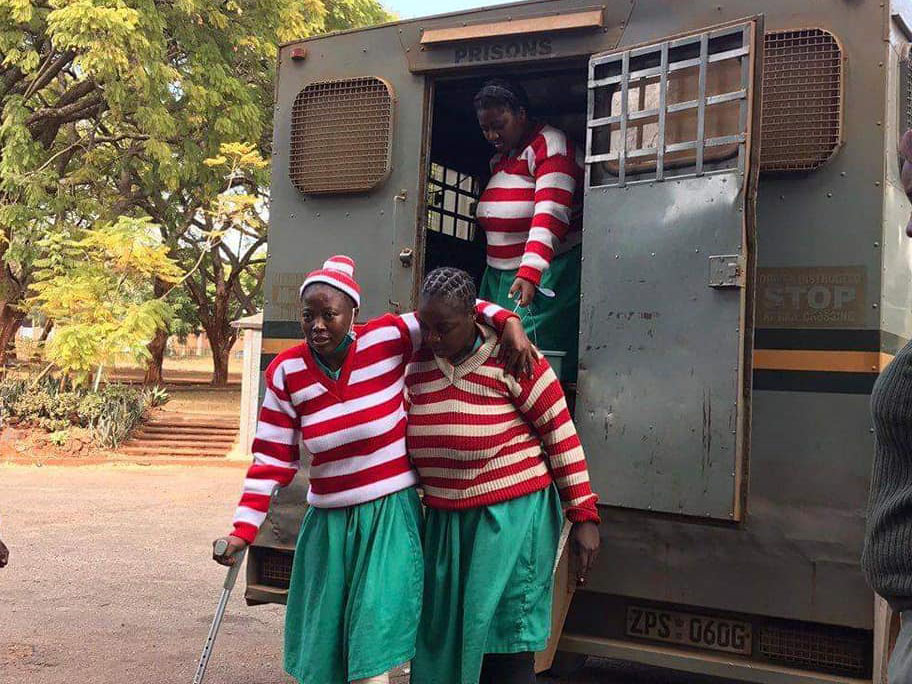 She saw him once in court, where he looked dirty and beaten and was, as with all those picked up, denied bail. When she tried taking food to the prison, it was rejected.
She saw him once in court, where he looked dirty and beaten and was, as with all those picked up, denied bail. When she tried taking food to the prison, it was rejected.
“They are deliberately starving them,” said Mtetwa, who is representing Evan Mawarire, a well-known pastor who was arrested after calling for non-violent protest against the fuel-price rises. “The prisons have no food and when we take things they refuse to accept it, saying it might have cholera.” No one knows where the crackdown is leading. Though there is clearly no love lost between the president and his deputy, they need each other, says Stephen Chan, professor of world politics at Soas, University of London (the School of Oriental and African Studies) and a regular visitor to Zimbabwe. “General Chiwenga and [Mnangagwa] are not a happy couple but they also can’t live without each other.”
Whatever the real reason for it, the violence is a huge disappointment for those who thought things would change post-Mugabe.
Among them is Kerry Kay, who knows only too well the scale of Mugabe repression after her husband, Iain, was beaten to within an inch of his life in 2002 by thugs carrying sticks wrapped with barbed wire, who forced them off their farm.
The last time I saw her was at the march in November 2017 to call for Mugabe’s resignation, where people cheered the soldiers who had arrested him. Then she was jubilant, hugging everyone and telling me she “felt 17”. Yesterday she was smuggling baby food to a woman who had been locked up with her 11-month-old child.
“I’ve documented hundreds of thousands of cases since 1998 and I can’t believe this is happening again,” she said. “These are evil bastards who have so much blood on their hands they could drown in it, and they will do anything to stay in power.”
39th Independence celebration
On 18th April, 2019, Zimbabweans celebrated 39 years of independence amid a cloud of dissatisfaction and worsening economic conditions.
The “celebrations” came just a few days after the prices of bread and other basic goods doubled again, a sure sign that citizens will soon witness the triple-figure inflation of 2008.
Just a year short of 40, Zimbabwe’s Promised Land remains a very distant possibility. The little hope created when long-term president Robert Mugabe was removed from office in November last year has all but vanished. The economy is getting worse and political seclusion from the world remains in effect.
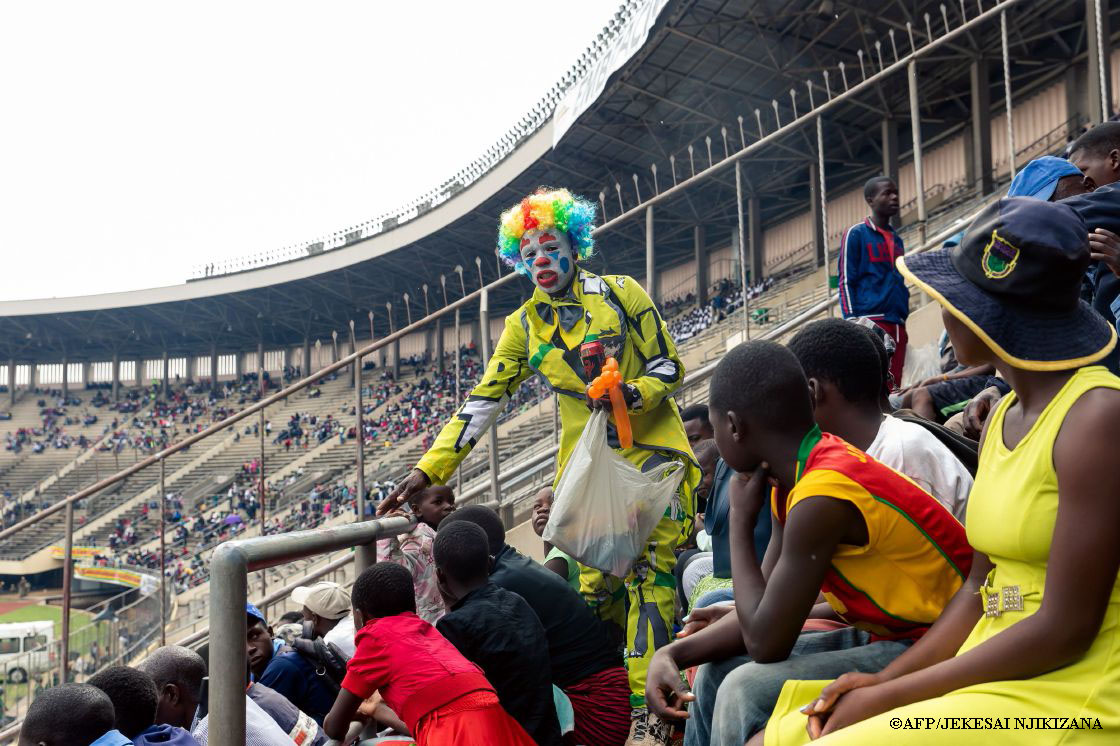 Unemployment still hovers above 90%. Hospital treatment and medicines are still the preserve of a few, so is decent education. There is an acute shortage of cash, forcing the government to introduce “a plastic market” for daily transactions. The bulk of the population now has to depend on neighbouring countries for basic goods and jobs.
Unemployment still hovers above 90%. Hospital treatment and medicines are still the preserve of a few, so is decent education. There is an acute shortage of cash, forcing the government to introduce “a plastic market” for daily transactions. The bulk of the population now has to depend on neighbouring countries for basic goods and jobs.
The country remains a pariah state and there are still Western-imposed sanctions imposed on individuals. Its efforts to be re-admitted to the Commonwealth have failed and it now depends on loans from neighbouring and eastern countries.
Conspicuous by his absence at the festivities was popular opposition leader Nelson Chamisa. He opted to issue a statement on Twitter saying Independence Day has come at a time when Zimbabweans were unsatisfied.
“As we commemorate our country’s cherished independence today, the stark reality is that most are reeling from abject poverty and frustrations. State decay, corruption and violence have shuttered the 1980 Uhuru dream and ruined livelihoods. Won’t rest until we attain change that delivers,” Chamisa tweeted.
Death of Mugabe aged 95 in Singapore
Robert Mugabe died aged 95 on 6th September 2019 in a hospital in Singapore where he had been receiving treatment since April. He was deposed almost two years previously in a military coup.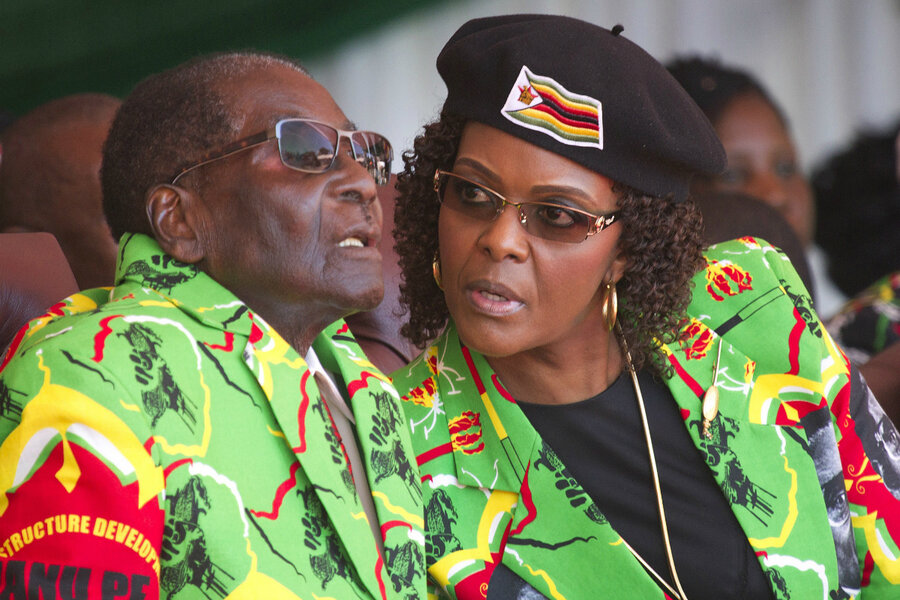
His 37 year rule will be remembered for violent repression of political opponents and Zimbabwe's economic ruin and his legacy is likely to haunt Zimbabwe for years.
His advancing years when he was in his 80s, and increasing health problems, saw much speculation as to who might replace him.
in 2017, Emmerson Mnangagwa was demoted as Vice-president. Grace, his second wife and former secretary was appointed Vice-President to enable her to take control in the event of his death in office. Such a handover was unacceptable to the military leaders. Mnangagwa promptly fled to South Africa for his safety but he returned and replaced Robert Mugabe as the leader of Zanu-PF.
Defiant to the end and barricaded at home, Mugabe refused initially to resign. But, on 21 November, during efforts to impeach him in the Zimbabwean parliament, the speaker of the House of Assembly announced that Robert Mugabe had finally resigned.
Mugabe negotiated a deal which protected him and his family from the risk of future prosecution and enabled him to retain his various business interests. He was also granted a house, servants, vehicles and full diplomatic status. Failing health plaqued him so he went into medical care.
"Is it better being oppressed by one’s own race than by those of a different colour?" asks Tendai Ruben Mbofana, 2022
It is rather disturbing that the world we live in today appears more “disgusted and 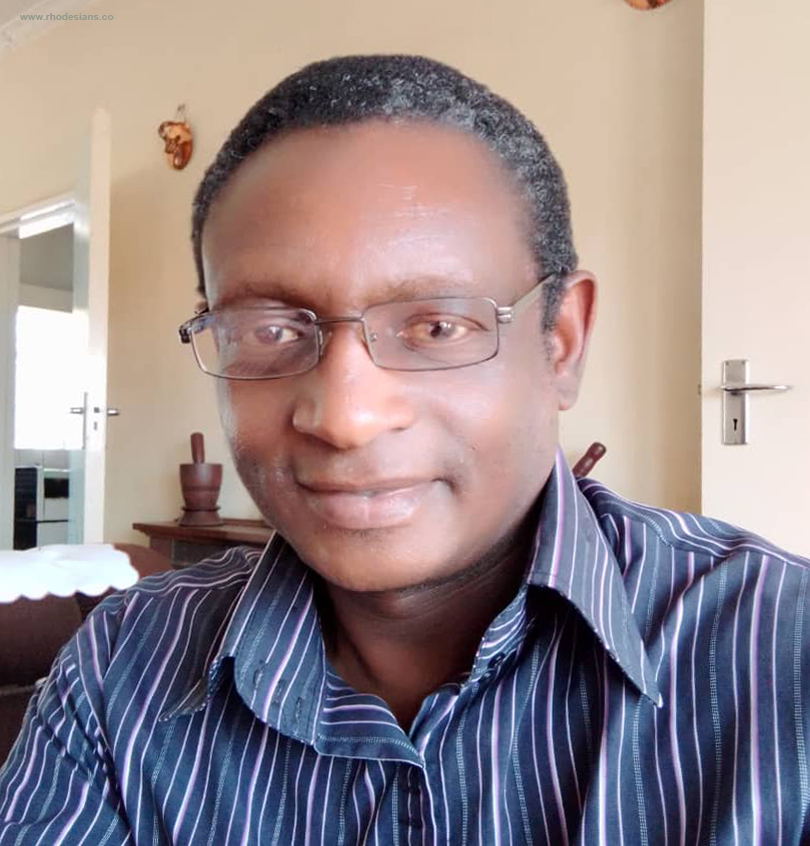 offended” by white-on-black rights violations – yet, exhibit a more laid back, lackluster response, more in the form of a half-hearted slap on the wrist, when it comes to black-on-black repression.
offended” by white-on-black rights violations – yet, exhibit a more laid back, lackluster response, more in the form of a half-hearted slap on the wrist, when it comes to black-on-black repression.
As someone who was born in colonial Rhodesia, and spent my adult life in independent Zimbabwe – subjugation, segregation, and economic marginalization by a whiteman is just as harmful and painful as by a blackman.
The velocity of a bullet from a gun held by a black dictator, is just as damaging as that from a white oppressor.
In fact, it can be more hurtful coming from a fellow black brother or sister – since, these are own kith and kin, from whom we expect better – than someone of a different colour, race, or creed.
I am sure there is nothing more traumatic than being betrayed, made to suffer, and even killed by one’s own family – whom we expect a bond of love and oneness – than an “outsider”.
I actually find it incredibly ridiculous that should a white person call me ... (by a racist name) now, and I was to post that online, this would immediately ignite global outrage and outcry aimed against this racism.
Yet, a black leader can loot (with his family and dubious hangers-on) our country’s resources – leaving millions of Zimbabweans wallowing in abject poverty – and this does not solicit much in terms of reaction, when it is posted online.
Let us not be hypocritical, and treat the issue of oppression with double standards – since subjugation by a fellow blackman deserves condemnation as that from a whiteman, as they are both “disgusting and offensive” .
"Zimbabweans will always suffer under a Government perpetually crying about sanctions" says Tendai Ruben Mbofana, 2023
As Zimbabweans continue to suffer through unmitigated poverty, under the ZANU PF regime, for the
past two decades – do they honestly see any light at the end of the tunnel?
Surely, every time I listen to President Emmerson Dambudzo Mnangagwa wailing over ‘sanctions’
supposedly imposed on the country, as well as so-called ‘saboteurs' – both blamed for the twenty years
of economic ruination – all hopes for a better Zimbabwe under his rule swiftly fade away.
How can we dream of an uplifted prosperous life – out of the perennial struggles we have been facing
for years – as long as we are led by people who always seem to have excuses for their own
monumental failures on speed dial?
This is a country endowed with vast globally sought-after minerals – which are not under any trade
embargo whatsoever – yet, those in power have been shamelessly unsuccessful in improving the
livelihoods of ordinary citizens. In fact, all they have managed to achieve is hogging world news
headlines for looting these resources – with statistics showing that Zimbabwe is prejudiced over US$2
billion each year – through smuggling, as well as illicit financial flows.
Yet, year after year those entrusted with running the affairs of our country have no qualms pointing
figures at others – namely, supposed sanctions and saboteurs – for the mess that they themselves have created. Therefore, my question becomes, “With these never-ending excuses, when will they finally manage to take Zimbabwe to a higher level of development”?
To be brutally frank, I never have faith in someone who is fond of giving excuses for his inability to
make good on expected deliverables. It is even worse when these excuses cover a span of over twenty
years.
Does this mean that if these ‘sanctions and saboteurs’ are real, then the ZANU PF administration has
not been able to find a way round them for more than two decades? Surely, if they could not take the
nation out of poverty in all this time – with ordinary 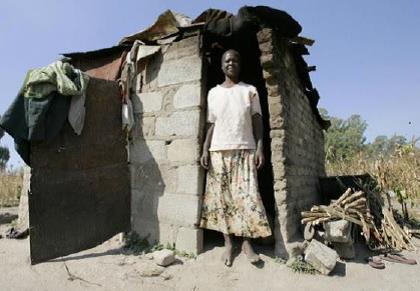 citizens’ livelihoods actually worsening by the day –
then, when will they finally get it right? Can we not say, ‘zvaramba, vazvitadza’? (If they refuse, they have sinned).
citizens’ livelihoods actually worsening by the day –
then, when will they finally get it right? Can we not say, ‘zvaramba, vazvitadza’? (If they refuse, they have sinned).
Only a person with something seriously amiss in their mind would believe that someone who has failed
to find a solution in over two decades – always proffering excuses – will miraculously somehow finally
succeed. This is especially so when there is nothing to show any real fundamental shift in thinking and
behaviour. We can even go as far as asserting that the lofty vision of an ‘upper middle-income
economy’ will remain a mere pipedream well beyond the targeted year of 2030.
As a matter of fact, as long as Zimbabweans allow this caboodle in power to continue in office, then, in
all likelihood, this ‘vision’ will be moved to 2050 – with the same ‘sanctions and saboteurs’ being cited
as reasons for missing the 2030 goal.
There will definitely be nothing shocking there – as this same ZANU PF government has never been
short of economic blueprints and grandiose ‘visions’, with promises of economic heaven – ever since
gaining power in 1980.
Nonetheless, not a single one has ever been accomplished – from ESAP, ZIMPREST, ZIMASSET,
Zimbabwe Millennium Recovery Program, the list is endless – as nothing of substance has ever been
achieved.
We were assured of ‘health and education for all by the year 2000’, Vision 2020, and numerous other
promises – whilst being urged to ‘tighten our belts’, as the economic challenges being faced were only
temporary.
However, it would appear that, according to ZANU PF logic, ‘temporary’ means forty years of poverty
and suffering – with no discernible reprieve in sight, ever since these economic programs began in the
late 1980s.
In fact, we have had the same excuse after excuse – from former Rhodesians, dissidents and
apartheid South Africa, to white farmers, the West, and opposition parties ‘seeking regime change’ – all
accused of sabotaging the country.
The only reason we seemed to have enjoyed a relatively good life immediately after independence, up
to the 1990s, was primarily because we were still benefiting from the remnants of the developments left
behind from the colonial era.
Of course, when one inherits a good thing, it can last for a while – even with minimal maintenance or
reinvestment – but, sooner rather than later, this will all crumble.
That is why our economy, companies (including state-owned), roads, bridges, hospitals, schools, towns
and cities appeared great during that period – whilst we also had reliable water and electricity supplies.
Nonetheless, that ‘honeymoon’ was soon to come spectacularly crashing down – because the post-colonial ZANU PF administration merely plundered without ever ploughing anything back into the
economy.
That is how parastatals as ZISCOSTEEL, NRZ (National Railways of Zimbabwe), Air Zimbabwe, as
well as our power stations, and water supply system were so horribly run into the ground, in a most
dramatic fashion.
Zimbabweans are globally renowned for being lovely patient people – nevertheless, are we seriously
saying we will continue to tolerate this destructive kleptomaniac regime for decades more – as we wait for the elusive ‘better life’? Please, people of Zimbabwe, let us not be fools! Those in power have had more than enough time to improve our livelihoods if they had the political will and desire. Yet, they have always opted to fatten their own bank balances – as they live in obscene opulence – in a sea of poverty and suffering of millions.
It is rather disingenuous listening to Mnangagwa claiming to be on the path of developing the nation,
‘with or without sanctions, as we use our own abundant national resources’.
Is this man for real! Why then have they been crying over these restrictive measures for the past two
decades, if they knew that they could still develop Zimbabwe ‘with or without sanctions’?
What has been stopping them from ‘using our own natural resources’ all this time – since these
targeted travel and financial restrictions were only imposed on a handful of individuals and
inconsequential entities – and not our minerals? What has changed now?
Have more people – although of little significance to the broader economy, as those before them – not
actually been added to the US ZIDERA (Zimbabwe Democracy and Economic Recovery Act)?
So, if these ‘sanctions’ are the real reasons we have been enduring such unimaginable pain and
suffering for over twenty years – what is the ZANU PF government doing today, which they could not
do all those years back? Please, stop lying to the people of Zimbabwe.
This looting incompetent cabal has no interest, and even the capacity, to improve the welfare and
wellbeing of the ordinary citizenry. If they did, they would have easily done a long time ago, what they
are promising today. They should not act as if gold, diamonds, chrome, platinum, and nearly 60 others
minerals were discovered in Zimbabwe only five years ago!
In fact, such minerals as gold are what attracted European, Asian and Arab traders, concession
seekers and colonists to Africa’s shores many centuries ago These are the same minerals that made
Rhodesia one of the most economically developed countries on the continent, if not the entire world –
which, at independence, was described by the late Tanzanian president Mwalimu Julius Nyerere, as
‘the jewel of Africa’.
Yet, today, all we ever hear about this precious mineral is how Gold Mafias – involving the highest
echelons of power in Zimbabwe – are being plundered at maddening and sickening levels, for the
benefit of only a small ruling clique.
At the same time, half the population lives in extreme poverty, with now three quarters earning below
the poverty datum line (with a small family requiring a staggering ZW$1,150,000 a month). This, as
most civil servants are not even getting a quarter of that – whilst elderly pensioners receive an average
ZW$40,000 a month – which can only buy four loaves of Proton bread.
In the midst of all the looting by the ruling elite, and suffering of millions – we are given excuses about
sanctions and saboteurs! Why are these supposed ‘sanctions and saboteurs’ only affecting the
ordinary masses, and not those in power – who are freely stashing billions of dollars stolen from our
national resources in countries as the UAE?
How come the government can so easily find money for a presidential jet costing US$54 million,
procure 32 helicopters for an overpriced US$320 million, or dole out billions more in supposed ‘loans’
to already well-to-do cabinet ministers, their deputies, and now court judges?
Yet, for some strange reason, is suddenly too broke to provide reliable electricity and water supply to
the citizenry, living wages to its workers, essential medication and radiotherapy machines in public
health care facilities, or adequate learning material in our schools.
Wake up, Zimbabweans!
If we want to remain poor, then let us keep these looters in power!
They will tell us about sanctions and saboteurs for decades to come – whilst we sink deeper and
deeper into misery and poverty.
Zimbabwe ruling party eyes supermajority in votes without opponents
A political crisis has been growing since a group of opposition Citizens Coalition for Change (CCC) MPs had their seats declared vacant.
Courts ruled on Thursday and Friday that all of the CCC contenders would be barred from standing in the new votes. 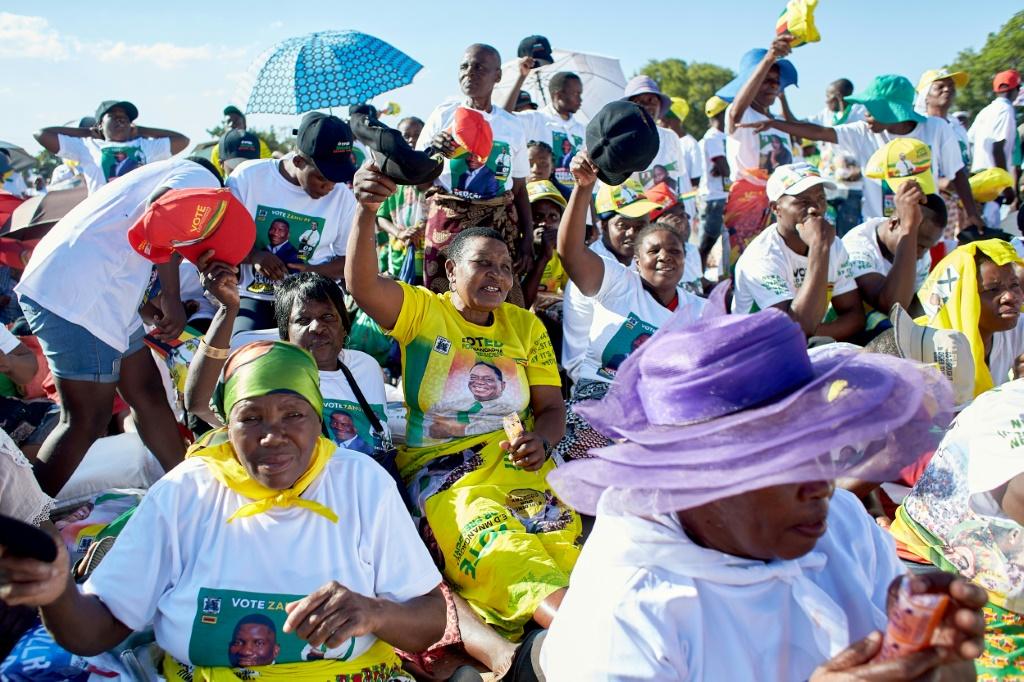
Barring a Supreme Court reversal, the ruling ZANU-PF will now pick up some easy seats as it moves closer to changing the constitution.
But authorities said that one of the by-elections would not even be held as there was only a ruling party candidate.
"The overall effect of this in terms of undermining any hope for Zimbabwe of democracy right now, is very clear," said Nic Cheeseman, a professor of African politics at the University of Birmingham in Britain.
The crisis was sparked by a letter sent in October by Songezo Tshabangu, a little-known politician claiming to be the CCC's interim secretary-general.
Addressed to the ZANU-PF parliamentary speaker, it stated that 15 CCC lawmakers elected in a bitterly contested legislative election in August had ceased to be party members and should lose their seats.
CCC leader Nelson Chamisa, 45, protested that Tshabangu was not a CCC member, the party had no secretary-general and had not expelled any MPs.
The speaker ignored him and declared the seats vacant.
This resulted in by-elections for nine seats that were adjudicated under a first-past-the-post system.
The rest were awarded using a proportional representation system.
ZANU-PF has denied causing the turmoil.
"We have an irresponsible opposition that is selfish and is self-imploding," party spokesman Farai Marapira told AFP.
The CCC said it expected its candidates to remain on the ballot pending a court appeal.
But in Mabvuku, a Harare suburb where a vote was supposed to be held on Saturday, electoral authorities said no by-election would take place on 9th December 2023.
The electoral commission declared the ZANU-PF candidate the winner uncontested after his CCC opponent was struck off the ballot.
ZANU-PF is 10 seats short of the two-thirds majority in the 280-member parliament needed to amend the constitution. The CCC won 104 seats in August.
Analysts believe ZANU-PF wants to scrap a two-term presidential limit. This would allow Mnangagwa, 81, to counter any challenge to his leadership.
The term limit was introduced in 2013 after long-time ruler Robert Mugabe was forced to accept a power-sharing government with the opposition.
Critics say Mnangagwa, who came to power on the back of a 2017 coup that toppled Mugabe, is even more autocratic than his predecessor.
Hopes that he could lead Zimbabwe on a more democratic path, foster foreign investment and turn around the dire economy have fallen by the wayside, said Christopher Vandome, of the Chatham House think tank in Britain.
Parliament has passed laws to silence dissent. The courts have been stripped of their independence, rights groups say.
International observers said the August election fell short of democratic standards.
The CCC has complained about intimidation against its members before and after the vote.
Meanwhile, Tshabangu, who denies being a ZANU-PF stooge, has penned more letters, seeking control of party funds and recalling another 13 lawmakers - something the CCC is battling in the courts with little success.
Sources
ABC news: Zimbabwe: Military chief puts Mugabe under house arrest; says takeover 'not a coup'. 16th November 2017. Open here
Amnesty International, Zimbabwe five years on whereabouts of journalist and pro-democracy activist still a mystery. March 9, 2020. Open here.
AP, AFP, Reuters, 2018. "Army opens fire on opposition protesters in Zimbabwe capital during wait for election results". 2nd August 2018. news.com.au. Open here.
Baker, Jill, 2016. "The people rise in anger and desperation". Facebook post by Noreen Welch.
BBC news, 2017. Zimbabwe crisis: Army takes over, says Mugabe is safe. 15th November, 2017. Open here.
BBC news, 2018. “Itai Dzamara: The man who stood up to Zimbabwe's Robert Mugabe and vanished”. 24th May 2018. Open here.
BBC news, 2019. “Robert Mugabe, Zimbabwe's strongman ex-president, dies aged 95”. Open here.
BBC news, 2019. “Obituary: Robert Mugabe, Zimbabwe's first post-independence leader”. 6th September 2019. Open here.
Bloomberg, 2017. Zimbabwe's Ousted Vice President Flees After Death Threats, Bloomberg News, USA, 8th November 2017.
Brock, J. and Dzirutwe, M., 2018. "President Emmerson Mnangagwa has been declared the winner of Zimbabwe's election". news.com.au. 3rd August, 2018.
Buchanan, Elsa, IB Times UK, 18th November 2016. "Zimbabwean pro-democracy activists abducted and beaten ahead of demonstration." Open here.
Business Standard, 2016. Activists abducted and beaten ahead of protests. 18th November 2016. Open here.
Cross, Eddie, 27th August, 2016. Email from Harare, Precipice
Cross, Eddie, 22nd November, 2017. After Mugabe.
DW.com, 2016. Zimbabwe pastor Evan Mawarire freed. 14th July, 2016. Open here.
Dzamara, Patson Dr. Facebook post, 7th August, 2016. On this day greatness was born
Dzamara, Patson Dr. Facebook post, 25th September, 2016. We can't retreat.
Financial Times, David Pilling and Joseph Cotterill, October, 2016. "Former Mugabe ally Mujuru leads Zimbabwe succession charge". Open here.
Fox news. 2017. Zimbabwe leader Mnangagwa, called 'The Crocodile,' promises to hit the ground running. 24th November 2017.
Independent, 2016. Robert Mugabe arrives back in Zimbabwe after health scare and jokes 'Yes, it's true, I was dead'. 3rd September 2016. Open here.
Fox News. "Zimbabwe leader Mnanagagwa, called The Crocodile', promises to hit the ground running. 24th November 2017. Open here.
Gutu, Obert, 2016. News Day. "Corruption, greed drive Zim to the cleaners", 7th October, 2016. Open here.
Mawarire, Evan, Mike Campbell Foundation, posts on Facebook, 9-11 September 2016.
Mbofana, Tendai Ruben, 2022. Is it better being oppressed by one’s own race than by those of a different colour? The Zimbabwean.co online. 29th April 2022.
Nehanda Radio, 3rd August, 2016. "Protests rock Harare". Open here.
Nehanda Radio, 4th August, 2016. "War veterans defiant". Open here.
Nehanda Radio, 3rd September, 2016. Mugabe returns home amid health rumours. Open here.
news.com.au. 2017. Zimbabwe's new leader returns to cheers. 23rd November 2017.
news.com.au, 2018. Army opens fire on opposition protesters in Zimbabwe capital during wait for election results. 2nd August, 2018.
news.com.au, 2023. Zimbabwe ruling party eyes supermajority in votes without opponents. news.com.au/Breaking news. 9th December 2023.
News Day, 10th September 2016. We are coming for you, Mugabe warns Tsvangirai. Open here.
News Day, 24th October, 2016. "Mliswa's win ominous for Zanu PF". Open here.
News Day, 25th October, 2016. "Mangudya paints gloomy picture for local banks". Open here.
NPR breaking news, 27th August, 2016. "Police break up 'Mega-demonstration' in defiance of Court order". Open here.
Reuters, 2019. Fuel price protests in Zimbabwe turn deadly. 14th January, 2019.
Samaita, Kevin, 2019. Zimbabwe celebrates independence day amid economic crisis. www.businesslive.co.za/world/africa. 18th April 2019.
The Australian, 2016. Robert Mugabe’s Zimbabwe at boiling point as povo rise in anger. 12th July 2016. Open here.
The Standard, 20th November, 2016. "Outrage over Zim rights abuse". Open here.
Zimbabwe News, 11th September, 2016. "Full List farm Ownership in Zimbabwe". Page no longer available.
Zimbabwe Situation, 28th August 2016. “The precipice.” Open here.
Zimbabwe Situation, 5th October, 2016. "Questions for Joice Mujuru about her past". Open here.
Zimbabwe Today, 12th October, 2016. "Germany tells Mugabe: We won't give you a Penny until you stop brutalizing Zimbabwe citizens and end corruption". Page no longer posted.
ZimLive, 2020. Gukurahundi architect and minister Perrance Shiri dies aged 65. Staff Reporter, 10:39, 29 Jul 2020


